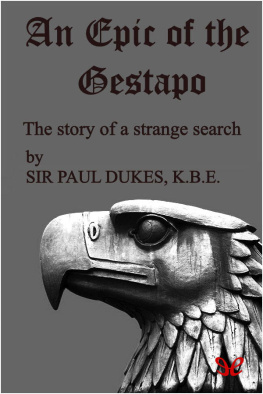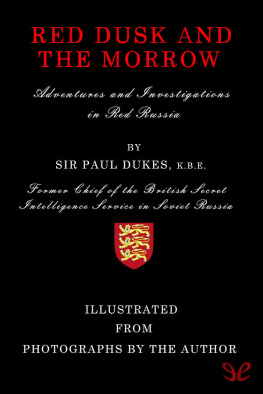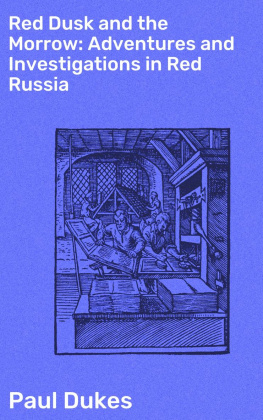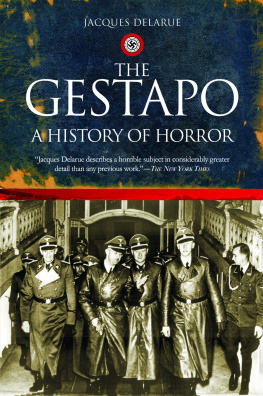Sir Paul Dukes - An Epic of the Gestapo
Here you can read online Sir Paul Dukes - An Epic of the Gestapo full text of the book (entire story) in english for free. Download pdf and epub, get meaning, cover and reviews about this ebook. year: 1940, publisher: ePubLibre, genre: Detective and thriller. Description of the work, (preface) as well as reviews are available. Best literature library LitArk.com created for fans of good reading and offers a wide selection of genres:
Romance novel
Science fiction
Adventure
Detective
Science
History
Home and family
Prose
Art
Politics
Computer
Non-fiction
Religion
Business
Children
Humor
Choose a favorite category and find really read worthwhile books. Enjoy immersion in the world of imagination, feel the emotions of the characters or learn something new for yourself, make an fascinating discovery.
- Book:An Epic of the Gestapo
- Author:
- Publisher:ePubLibre
- Genre:
- Year:1940
- Rating:5 / 5
- Favourites:Add to favourites
- Your mark:
- 100
- 1
- 2
- 3
- 4
- 5
An Epic of the Gestapo: summary, description and annotation
We offer to read an annotation, description, summary or preface (depends on what the author of the book "An Epic of the Gestapo" wrote himself). If you haven't found the necessary information about the book — write in the comments, we will try to find it.
An Epic of the Gestapo — read online for free the complete book (whole text) full work
Below is the text of the book, divided by pages. System saving the place of the last page read, allows you to conveniently read the book "An Epic of the Gestapo" online for free, without having to search again every time where you left off. Put a bookmark, and you can go to the page where you finished reading at any time.
Font size:
Interval:
Bookmark:
It is a superb summer day. The second of June, 1939. Berlin is en fteto order, of course. Prince Paul of Yugoslavia has arrived to pay a five-day ceremonial visit to Hitler. The capital is beflagged, all shops are closed, all business stopped except restaurants. Serried ranks of labour battalions and school children trudge, singing, towards their allotted points. Berliners are a bit tired of these never-ending celebrations, which are necessarily of a sameness and dislocate normal life. Certainly I am, for they are most inconvenient when you want to call on people. This is not the first time recently that I have had the ill-luck to arrive in the capital, as I did yesterday, on the same day as some potentate for whom the city is bedecked, a bank holiday proclaimed, with the populace willy-nilly thronging the streets: last time I turned up on the same day as Count Ciano who had come to sign the Axis military alliance. Ciano and his suite stayed at the Adlon too, and I bumped into him when I came down the stairs just as he emerged round the comer from the lift. The swarm of monocled German and Italian staff officers clicking their heels in the hall glared daggers at the clumsy Britisher. But how was I to know Ciano was just there? I of course apologized, and the Count nodded charmingly, and everything was all right. Indeed, it being an ill wind, etc., the little contretemps secured me a front place in the parades in his honour.
But imposing though Count Cianos reception had been, it paled into nothingness by comparison with that accorded to Prince Paul of Yugoslavia. Nor was this merely because Prince Paul was the acting head of a state whereas Ciano was only a plenipotentiary. It went deeper than that. Germanyor rather, Hitlerwas very, very concerned to win over the hesitating Yugoslavia to partnership in the Anti-Comintern Pact. The Muscovite Jew-ridden gang of world conspirators, as Hitler still regarded them, were to have another nation added to the list of their declared foes. The prospects seemed promising. The late King Alexander of Yugoslavia, assassinated at Marseilles in 1934, had been one of the most implacable and uncompromising foes of Soviet Russia. And if, as events proved, all the Fhrers blandishments were of no avail, it is said to have been due mainly to the tact and intelligence of Prince Pauls highly gifted wife, Princess Olga, who with unerring adroitness parried every diplomatic thrust and avoided every pitfall placed in the way by the wily and pressing Fhrer. For Hitler, with all his supposed asceticism, has always been oddly susceptible to the influence of women.
But meanwhile, the reception to the princely couple was to outdo in its magnificence even that to Mussolini. Its principal feature was to be a vast display of military might. The parade of engines of war, including new tanks of a type not before seen, extended miles along the decorated avenue from the Brandenburg Tor to Charlottenburg, where the royal visitors occupied the Castle Bellevue. The sky was thick with squadrons of roaring warplanes flying the whole length of Berlin from the ex-Kaisers palace along Unter den Linden and the Charlottenburg Chausse and returning in a semicircle to repeat the flight so that the parade should be continuous.
The noise was deafening. To escape it I made my way in the opposite direction until I came to the Schlossplatz. Here I sat down under the awning of a little cafe to beer and contemplation. The huge bulk of the Neptune fountain spouted its water jets in the middle of the square while children played in its basins, and beyond it the rear faade of the ex-Kaisers palace, now somewhat shabby, formed a partial screen from the noise of the low-flying planes.
As I ordered myself a large Pilsener I looked up at the vast mass of the empty palace. To-day it was closed. No visitors would be trooped through its rooms and halls. They would be silent and deserted but for the lingering ghosts of the past. For a moment I saw clearly in my minds eye the Kaisers study and his large carved desk, on which there is now an engraved plate saying: At this desk Kaiser Wilhelm II signed the order for general mobilization on the 1st of August, 1914. That deskdid you know this?was made of oak taken from H.M.S. Victory, presented to the Kaiser, if I remember rightly, by King Edward VII; and as Wilhelm II, after signing the mobilization order, laid aside his pen his eyes can hardly have failed to fall upon the famous signal, inset in little enamel flags across the front of the desk: England expects that every man will do his duty. Is there in all history a starker instance of fate defied? Did the Kaiser say to himself, even as his pen scratched the paper, England will not fightwhen she says she will she doesnt mean it? I often wonder whether the bitterest of all his regrets may not be the memory of that momentthat before he dipped his pen in the ink his eye did not halt upon that little row of flags: and that, recalling the end of him against whom Nelson had hoisted that signal, instead of tearing up the scrap of paper guaranteeing the integrity of Belgium, he did not stay his hand even then and tear up the mobilization order lying before him.
Little thought the Kaiser, as he thus signed his own doom, that an unsuccessful Austrian painter whose hobby was politics, hailing from the insignificant town of Braunau and barely able to make ends meet by odd jobs at Munich, was at that moment following the imperial decisions with more than bated breath, fearful lest the Emperor should not take the fateful step, and hurrying, when it was taken, a few days lateron the 16th to be preciseto join the German Army as a volunteer. Little thought the Kaiser (or anyone else, for that matter) that the said unsuccessful craftsman and amateur politician would one day sit in the imperial seat, the unchallenged head of the German State, while the Kaiser pined in exile. And little thought the amateur politician himself that twenty-five years after the prosaic 16.8.14 marked in his recruiting entry, he, as Fhrer and Chancellor of the Third Reich, would be faced with exactly the same decision of war or peace for the world as his erstwhile imperial predecessor.
Would he make the same fatal error? Oh, that he would seat himself at the ex-Kaisers desk and fix his eyes upon that little row of flags! Would he heed its warning? Or would he, too, with that incredible faculty for self-delusion which stamps the German politician, denying the lesson of history, say within himself: Nonsense, Nelson didn't mean it!and sign an order as fatal as the Kaisers?
Alas for the world, that is precisely what he did do, fourteen days after the twenty-fifth anniversary of that prosaic 16.8.14.
Hitler`s Recruiting Entry in 1914
1. Christian and Surname:
Adolf Hitler
Born 20th April 1889
at Braunau-on-Inn
District Braunau
State Upper Austria.
2. Rank or Profession: Painter
3. Religion: Cath.
4. Whether married: bachelor
5. Children:
6. Date and form of service entry:
16.8.14 as volunteer
7. Military unit (giving company, squadron, battery):
Rek. O. V1./E.D./2.1.R.

But three months were yet to elapse ere this occurred when I sat speculating upon these possibilities, drinking beer in the Schlossplatz on the 2nd of June, 1939, while the warplanes in the hot sky thundered into alignment and droned away into the distance.
Sweltering beneath the awning, I brushed my unprofitable speculations aside. For I had other things to think of. My mind was set not upon politics as I ordered myself another Pilsener. It was set upon something seemingly trivial by comparison and far removed from the pomp and display of Berlin. Yet for me very urgent. Turning from planes, palaces, and parades, I opened a newspaper and spread it on the table. It contained a notice which was of profound interest to me. But it was not a Berlin newspaper, nor did it bear the date 2nd of June or contain any reference to the showy event taking place near at hand. It was a small provincial newspaper called Die Zeit (Time), published at a small provincial town called Reichenberg, in Sudetenland, which until October, 1938, had belonged to Czechoslovakia and was now situated about fifteen miles from the frontier of the new Protectorate of Bohemia and Moravia.
Font size:
Interval:
Bookmark:
Similar books «An Epic of the Gestapo»
Look at similar books to An Epic of the Gestapo. We have selected literature similar in name and meaning in the hope of providing readers with more options to find new, interesting, not yet read works.
Discussion, reviews of the book An Epic of the Gestapo and just readers' own opinions. Leave your comments, write what you think about the work, its meaning or the main characters. Specify what exactly you liked and what you didn't like, and why you think so.












